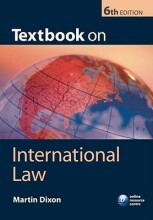Summary: Textbook On International Law | 9780199208180 | Martin Dixon
- This + 400k other summaries
- A unique study and practice tool
- Never study anything twice again
- Get the grades you hope for
- 100% sure, 100% understanding
Read the summary and the most important questions on Textbook on international law | 9780199208180 | Martin Dixon.
-
1 The nature of international law and the international system
This is a preview. There are 8 more flashcards available for chapter 1
Show more cards here -
What is meant by positivism and naturalism and to what extent have these philosophies influenced the development and contents of international law?
Positivism is law made by men, the main thing is the procedures. The procedures have to be followed and then there are rules. It’s mainly done by states ( treaties ).
Naturalism is custom (habit) everybody does it so it’s normal. Naturalism is the opposite of positivism. It’s not about the procedures but about what’s fair and normal ( human rights ). It’s about persons / individuals.
-
Name one of the primary purposes of international law.
The maintenance of an ordered community where the weak are protected from arbitrary action by the strong. -
What is the main responsibility of the International Criminal Court?
Prosecuting individuals for violation of fundamental international human rights. -
To what extent does the nature of international law differs from national law?
National law
International law
Individuals / persons
States
Authority / superior ( government )
Equal, Agreements
Government enforcement ( deurwaarder )
Overleg, international court
No international police
-
What is national law primarily concerned with?
The legal rights and duties of legal persons within a body politic - the state or simular entity. -
What are the strengths and weaknesses of international law system?
Strengths of International law:
- It cares for a stable and orderly society
- It’s flexible
- Easier for states to interact
- Enhances international relations
Weakness of International law:
- Lack of formal enforcement, no actions
- Flexibility brings uncertainty
- Treaties are slow and difficult to adapt
- General and not specific, treaties are open and vague
- Very much linked to politics ( also a strength )
-
Where is national 'law' commonly derived from?
A legal superior, recognised as competent by the society to whom the law is addressed (e.g. in a constitution), and having both the authority and practical competence to make and enforce that law. -
How did international law develop and what is meant by horizontal and vertical expansion?
Development: 400 years ago trade law and sea law was very important. After WOII human rights came up. In the last decades it’s impossible for states to isolate. They are forced to give up a part of their sovereignty.
-
1.1 The role of international law
This is a preview. There are 20 more flashcards available for chapter 1.1
Show more cards here -
What kind of system does international law comprise?
A system of rules and principles that govern the international relations between sovereign states and other institutional subjects of international law such as the United Nations and the African Union. -
what does international law comprises (omvatten)?
A system of rules and principles that govern (regeert) the international relations between sovereign states and other institutional subject of international law (e.g. UN).
- Higher grades + faster learning
- Never study anything twice
- 100% sure, 100% understanding
Topics related to Summary: Textbook On International Law
-
The nature of international law and the international system
-
The sources of international law - Article 38 of the Statute of the Internationa Court of Justice
-
The sources of international law - Custom
-
State responsibility - General issues of state responsibility
-
State responsibility - The treatment of foreign nationals
-
State responsibility - Expropriation of foreign-owned property
-
Human rights - The development of the law of human rights

































